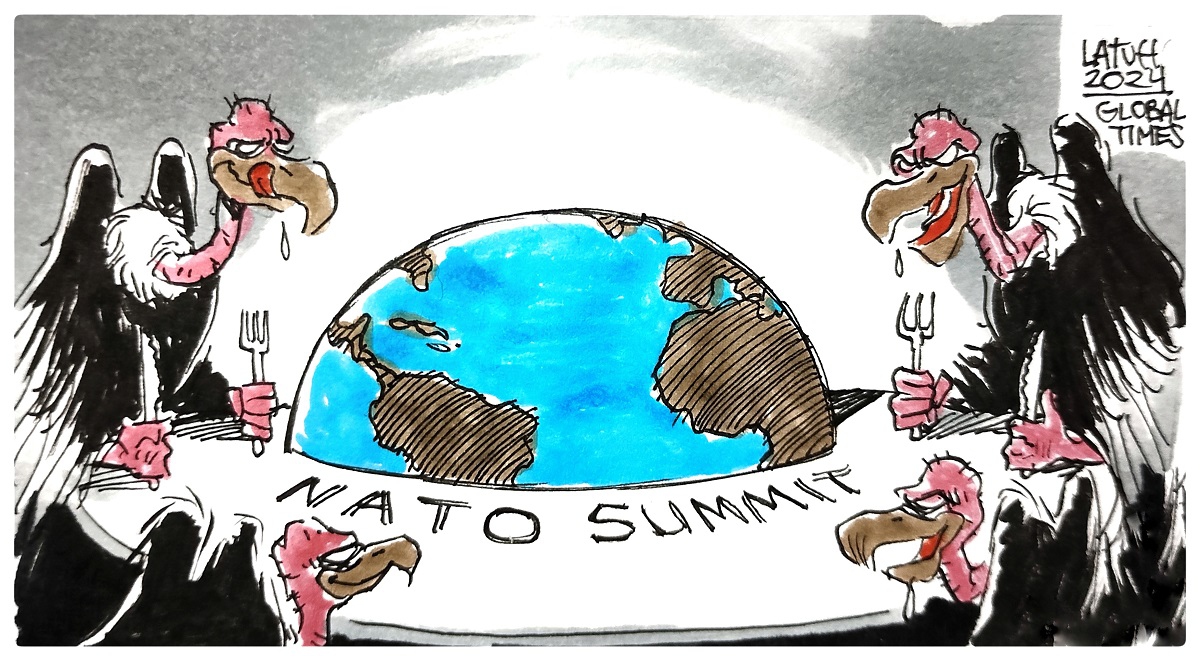
Cartoon: Carlos Latuff
Two important security-related summits took place in July: the NATO summit in Washington DC this week, and the Shanghai Cooperation Organization (SCO) summit ended in Astana, Kazakhstan last week. These two inter-governmental organizations, although both claiming to be defensive in nature, could not be more different.
As Lord Hastings Lionel Ismay, NATO's first Secretary General, famously said, NATO was created to "keep the Soviet Union out, the Americans in, and the Germans down." It should have disbanded with the collapse of the Soviet Union and the Warsaw Pact in 1991. Instead, it immediately morphed into an imperial entity that spread to Eastern Europe despite assurances given to Gorbachev that NATO "would not expand one inch eastward," becoming an imperial occupation army expanding far away from its "North-Atlantic" shores, fostering forever wars in Europe, the Middle East, Afghanistan and now Asia and other ventures in the Asia-Pacific.
On the contrary, the SCO was since its inception a defensive organization designed to fight the "Three Evils" of separatism, extremism and terrorism that emerged in Central Asia, the vicinity of Russia and China, that was destabilized by the Anglo-American hegemon.
The two summits taking place this month greatly differ in the issues they tackle, and reveal the widening divide between an isolated West refusing to acknowledge the ascent of a multipolar world, and a rising Global South that is waking up to say no to the Anglo-American hegemon.
Regarding the NATO summit, the first is its obsession with Ukraine, considering the fact that it is not even a member state of NATO, nor of the EU. By endlessly pumping weapons into Ukraine, and providing it with a tentative roadmap to "official membership," NATO is showing that it does not have a genuine interest in peace in the region. It also expects from the EU a long-term financial pledge for Ukraine, which amounts to economic suicide for European economies, and is not justified by anything other than Anglo-American neo-colonial ideology: the bleeding of the EU's economy for the conquest and reconstruction of a colony.
The second issue tackled at this week's NATO summit is the crushing of dissent within its own ranks. Hungarian Prime Minister Viktor Orban's visit to Moscow and Beijing to discuss a peace deal has sparked fury in EU and NATO countries, making them rush to explain that Orban lacked legitimacy and a mandate from the EU to negotiate a truce with Putin.
Here again, Western leaders' reaction shows that the collective West will not allow negotiation with both belligerents in the same room to achieve a deal that would not be brokered by the West. What the Anglo-American hegemon and its European vassal states want is to fortify their position in Ukraine, secure their access to the huge lithium deposits of Donbass, and use the Ukrainian people as a saber to weaken Russia.
It is in stark contrast with the recent summit of the SCO in Astana. This year, apart from security concerns still topping the agenda, the summit was a forum for discussions and agreements on the economic prosperity of all members, the opening to all Eurasian neighbors regardless of their level of economic development or their ideology, as long as they contribute to common security and good neighborliness, and the inter-connectivity of the several corridors of logistics that crisscross the Eurasian landmass, that need to be connected to become a viable alternative to the maritime route that goes through the Malacca and Suez choke points.
On the account of enlarging of the SCO, Vladimir Putin went as far as saying that SCO was opened to membership applications from all Eurasian countries, event those that might already be members of NATO.
The facts are before our eyes: NATO is bellicose toward outsiders, autocratic with its members, and does not seem to have a goal other than expansion and the encirclement of Russia and China. Although it is called the North-Atlantic Treaty Organization, it did not shy away from considering the opening of a representative office in Tokyo last year, a move that was unexpectedly blocked by France.
On the other hand, the SCO is inclusive, respectful of different opinions and cultures, does not impose economic or democratic criteria on applicants, and comes across as a democratic inter-governmental organization that does not have a top-down power structure like NATO has.
Finally, and perhaps most importantly, the members of SCO are not considering leaving the organization, unlike some NATO members such as France, which has already exited NATO once, in 1966, and a sizeable number of its population and politicians would like to see it happen again. Hungary is also reassessing its level of participation in NATO due to its disagreement on the war in Ukraine, and so does Turkey.
This trend, which we can imagine would see some NATO members soon becoming SCO candidates, with or without leaving NATO, could tip the balance of power between an aggressive, exclusive and outdated NATO on one side, and a defensive, inclusive and timely SCO on the other side, with the latter neutralizing the former.
The author is a former diplomat, advertising executive and entrepreneur who has worked 25 years in Greater China. He is the author of "Understanding the relation between China and the West" published in France in 2022, and soon to be released in its Chinese version.




